German mission of General Petrov
After the signing of the Nonaggression Pact by the USSR and Germany in 1939, an agreement was reached on a trade and economic agreement between the parties. In exchange for certain types of raw materials, the Germans pledged to supply industrial equipment, modern machine tools, machines, models of military equipment, including aviation.
At the end of October 1939, a group of specialists led by I.F. Tevosyan. It consisted of aircraft designers A.S. Yakovlev and N.N. Polikarpov, director of the plant P.V. Dementiev, First Deputy People's Commissar, Specialist in Engine Engineering V.P. Balandin, as well as the designers A.D. Shvetsov, V.P. Kuznetsov, test pilots S.P. Suprun, I.F. Petrov. The group was led by General A.I. Gusev. The delegation had to become familiar with aviation technology and purchase the most interesting samples for studying or equipping domestic enterprises.
One of the first Soviet delegation was received by German Deputy Minister of Aviation Colonel-General Udet. It was a very famous pilot. During the First World War, he, like Aviation Minister Hermann Goering, became a recognized ace. Udet was still flying; by that time he had just set a new world speed record on a Heinkel plane, and as Goering’s deputy he was in charge of the technical part of the Luftwaffe.
General Udet made a good impression on the delegation from Moscow. He promised to show all the military equipment of Germany - and aircraft, and engines, and the latest aviation equipment. At the airport Ioganistal near Berlin, our specialists have really seen a lot of combat equipment of the Luftwaffe: dive bomber Ju-87, twin-engine bomber Ju-88 and Do-215, fighter He-100, Bf.109, Bf.110,-reconnaissance aircraft FW-187.
The Germans did not hide anything. The Soviet delegation was given the opportunity to get acquainted with the serial production of combat aircraft, as well as with the technological equipment of factory workshops. Our specialists visited Heinkel Aircraft Plants in Rostock, Junkers in Dessau, Dornier in Friedrichshafen, Messerschmitt in Regensburg and Augsburg, Focke Wolfe in Bremen, Henschel in Schönefelde. Daimler Benz motors were shown in Stuptart and Bisdorf, Junkers in Dessau, BMW in Munich. The Germans did not even hide the factories supplying components and equipment for aircraft and motors: Bosch in Stuttgart, Schwartz in Berlin, Junkers in Magdeburg, Karl Zeiss in Jena, Scania Werke in Berlin and many others . As a result of the inspection of the factories and enterprises, our delegation was able to familiarize not only with the existing structures of combat vehicles, but also with the prospects for their further development.
“After returning to Berlin, the Soviet delegation, as originally promised, again received Udet,” recalled A.S. Yakovlev. “However, after the tactless statement of General Gusev that the aircraft shown to Soviet specialists are obsolete and not of interest, the attitude of the German Deputy Minister of Aviation has changed dramatically.” Udet with a sharpness in his voice said that he was an officer, and was responsible for his words, and if representatives of the delegation did not like what they were shown, then no one forces them to buy. So our specialists returned to their homeland.
In the March days of the fortieth year, a decision was taken to send a second trade and economic delegation to Germany. Ivan Fedorovich Petrov recalled that just before his departure, Stalin summoned him to the Kremlin. Ivan Fedorovich had just become an assistant to the head of the Air Force Research Institute, and was sent to Germany as deputy head of the aviation group. Stalin identified Yakovlev as the leader, with whom Petrov was at that time at the leader’s reception. Alexander Sergeevich appealed to Stalin with a request to increase his daily allowance to sent comrades. He said that our specialists in Berlin and in other cities live in bad hotels, save money on transport, on tips, and thus compromise themselves abroad. Stalin phoned Mikoyan, asked how many Soviet seconded employees receive daily subsistence allowance, and upon learning that he had twelve marks, he suggested that they increase to twenty-five.
The team leader thanked Stalin for his support and immediately resolved another problem. The fact is that the bureaucratic system of the state, being improved from year to year, before the war looked already fully established. For example, they decided to buy planes from the Germans. The application is written to the trade mission, it makes a request to Moscow, to the People's Commissariat of Foreign Trade, which will send the application for an opinion to the People's Commissariat of the aviation industry and to the Air Force Directorate. There, in order to solve something, they should think, and this dragged on time. Yakovlev asked Stalin for the permission of the delegation to purchase on the spot what would be deemed necessary under his responsibility. Stalin agreed and asked how much it would take for such purchases of currency. “Thousand one hundred, maybe two hundred,” Alexander Sergeevich modestly estimated. Stalin immediately called Mikoyan again and ordered to allocate one million marks to the delegation. When used up, another million.
The Soviet representatives at that time bought a lot of valuable and necessary aerodrome equipment, all-terrain vehicles, small-sized group cars, technical literature. Ivan Fyodorovichi recalled that they had acquired even the technical process of producing Kullman’s drawing boards. Only half a million marks were spent on everything.
And to Petrov himself, on the eve of his departure for Germany, Stalin gave a personal task. He asked to do as much as possible - to implement the consent of the German side to sell us aircraft and engines. When inspecting the aircraft, it was necessary to determine the German industrial potential. Stalin stressed that it is very important for us to find out how much Germans can produce combat vehicles per day, in wartime.
The already difficult task received by Petrov was complicated by the fact that none of the Soviet delegation was left alone for a minute. Constantly someone from the representatives of the German side accompanied, not giving the opportunity to exchange views or write something down. To I.F. Petrov was first escorted by the colonel of the Gestapo, and then the general was added. Ivan Fedorovich explained such attention to his person by the fact that in those days a decree was introduced in the Soviet press introducing the military rank of general in the Red Army. Among the first 16 people to whom this title was awarded was I.F. Petrov. Pravda placed portraits of sixteen. The Germans were silently silent about the assignment of lampas to an ordinary engineer of TsAGI, as Ivan Fedorovich presented in the delegation’s documents, but the Gestapo general was assigned to him nevertheless. Germans are pedantic people.
219 aviation points inspected the members of the delegation on that trip. More than 200 telegrams were transferred to the Kremlin. After visiting the main aviation enterprises of Germany, P.V. Dementiev, A.S. Yakovlev, N.N. Polikarpov and most of the other members of the aviation group returned to Moscow, and Alexander Sergeyevich entrusted all his care in purchasing and dispatching combat vehicles to his deputy. Petrov, test pilot S.N. Suprun, engineer of the USSR Trade Mission in Germany V.K. Mikhin and translator N.N. Perlova.
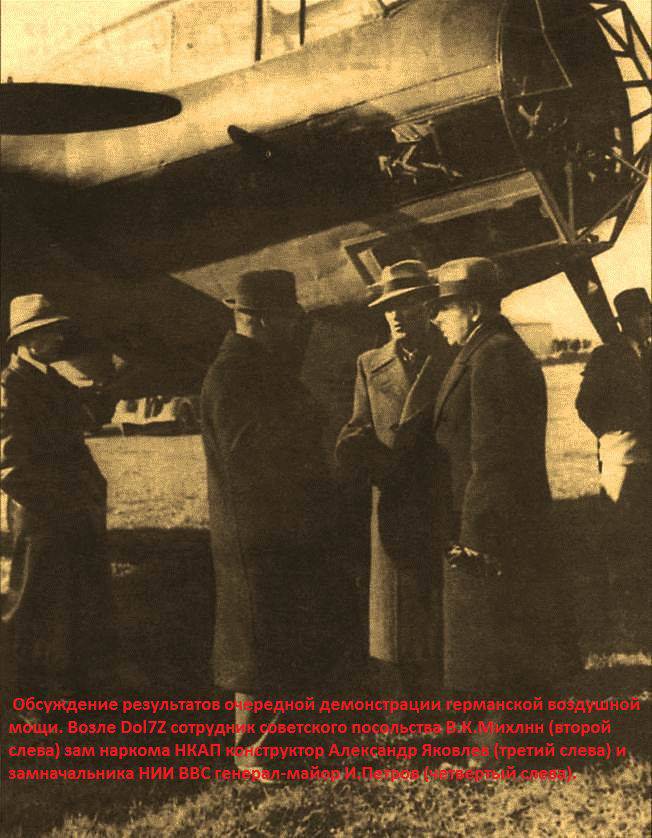
Ivan Fedorovich met Udet, Willy Messerschmitt and Heinkel again. Udet took an interest in the impression made by the German aircraft industry on the Soviet delegation. Petrov replied that the Germans had a powerful industry, at a modern high level, and, apparently, was capable of fulfilling any plans it had set. Udet pondered, then said: "But we have great difficulties with the plan ... The problem is the absence of metal." But the German leadership, according to Udet, confuses little because it expects a lightning war to last for no more than three months. Therefore, plans have been developed for the coming 2-2,5 of the month, and according to them, during the war period in Germany, 70-80 combat aircraft will be produced daily. And then everything will be determined by war and metal. As you can see, it was about increasing the production of aircraft to 70 — 80 copies per month (in the event of the beginning of the war with the USSR) and for a limited period of 2 — 2,5 months. That is, in fact, the German aircraft industry did not produce as many cars, and if it reached this level, it would be able to maintain it for a long time.
The next meeting was with Willy Messerschmitt, who was not too favored by the Russians. A member of the Nazi party, he did not build any special illusions about friendship with the Soviet Union and, when it came to his new plane, the Messerschmitt-209, did not immediately show this car. She has not been brought yet. Russian engineers expressed their opinion to the designer, and then Willy Messerschmitt, tall, thin, discharged a short queue: “I do not like it ?! But, in my opinion, the opinion is a great car! ”
The first plane Ivan Fedorovich Petrov decided to buy from Heinkel. "Non-100" was at that time the fastest fighter in the world. The Germans bargained with our delegation in the office of the chief designer, determined the price of the car and went to the airfield to touch the goods with their hands. Stepan Suprun sat in the cabin, professionally inspected the instruments, control of the aircraft and asked Petrov to check it. Ivan Fedorovich listened Supruna, I realized that the tester figured out in an unfamiliar machine. And both have already asked the Germans permission to start. At the airport they ran, began to fuss. Representatives of the company were not recommended to demonstrate this car in flight. Half an hour later, they approach and declare that there is a strict Goring instruction, according to which only those pilots who have undergone three-month training on this aircraft are allowed to fly on Non-100. The Russian delegation began to explain that Suprun was a test pilot, that he had no price, and what kind of training was there for such an air master ... Company representatives again began to fuss. Half an hour later, a new demand is announced that for the permission it is necessary to pay the full cost of the aircraft - should that ... Petrov signed the corresponding document.
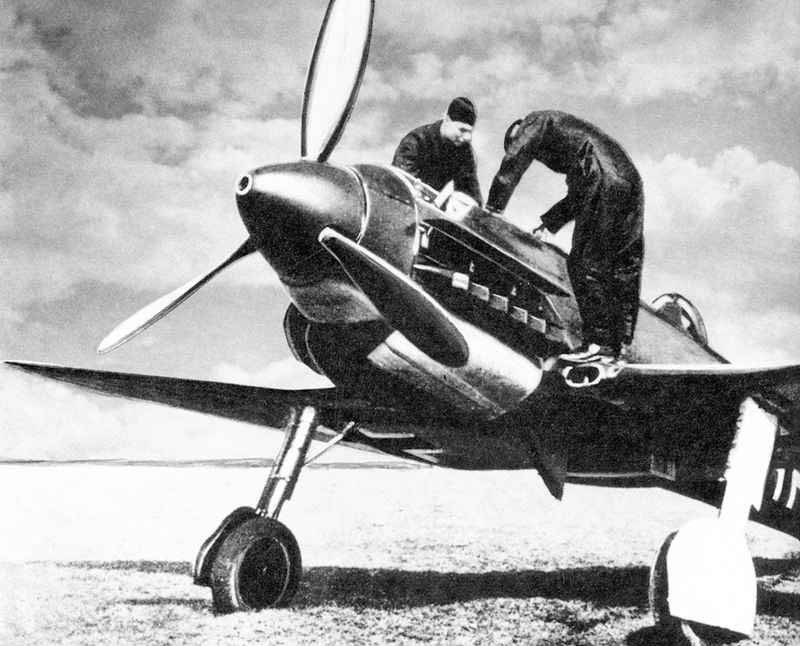
Time is ticking, but the plane is not being towed onto the runway. After a long wait, Ivan Fyodorovich was personally brought a letter, which informed that in the event of a disaster the company was not responsible for the life of the pilot. And this obligation Petrov also signed. Suprun, of course, did not show - not such psychological tests before the flight. After all, the Heinkel was finally pulled onto the runway. Stepan flew into the air and spun aerobatic flying over the airfield.
When Suprun landed, the German pilots rushed to the car, pulled Stepan out of the cabin and carried him to his dining room. The owner of the company Heinkel, according to the memoirs of Petrov, still a strong old man, gave a real banquet there. The famous aircraft designer was so excited about the flight that a Russian pilot had just demonstrated on his plane that he offered to salute him with crystal glasses. The Germans pulled a thick sheet of aviation plywood and, after each toast, emptied wine glasses flew into that wall. By the end of the banquet, a whole slide of broken Bohemian crystal had grown. A lot of good words were then said to the Russians. Heinkel sang a song about Stenka Razin. “I really love Russians. My long-cherished dream is to personally visit Russia, ”the owner of a well-known aircraft manufacturer repeated to Ivan Fedorovich several times. But to visit Heinkel in Russia was not possible. It will take a little more than a year, and Heinkel battle vehicles, loaded with bombs, will head for the east.
Based on the estimates of the aviation group, it was then decided to purchase five Non-100, Bf.110 and Bf.109E fighter aircraft, as well as Ju-88К1 bombers (diving version), Ju-87, and Do-215 fighter planes - two cars each. The experienced Do-217 bombers and the FW-190 fighter decided not to purchase because they were still in the testing phase.
Ivan Fedorovich remembered that Stalin personally punished him, and figured out the possibilities of the German industrial potential. His calculations coincided with the figures voiced by Udet on the 70-80 aircraft per day. Returning to Moscow, Petrov made a message and gave his calculations at the board of the People's Commissariat of the aircraft industry. The colleague was led by the people's commissar A.I. Shakhurin. After the message, he closed the meeting and called the secretary of the Central Committee of the CPSU (b) G. M. Malenkov. There was an order to immediately come to him. As soon as Petrov entered the office, Malenkov asked Petrov to confirm the calculated figure. Then he dialed Stalin and reported to him. Naturally, the judgment of the results of a trip to Germany to Stalin was more appropriate to hear not in someone else's program, but from the one who was given the task. So after the call to Stalin, Malenkov, Petrov and Shakhurin went to his dacha. Stalin, listened to the brief report of General Petrov. Shahurin was tense during the entire meeting. His reaction was understandable. After all, at that time we only produced 26 combat aircraft per day, and, accordingly, the correlation with the German aircraft industry 80: 26 clearly did not speak in favor of the leaders of the aircraft industry.
After listening to the report and reviewing the calculations, Stalin told Malenkov that it was necessary to deploy our aircraft industry to produce daily combat aircraft no less than the Germans, that is, on 70-80 machines per day. A few days after this meeting, Stalin, along with Peter Vasilyevich Dementyev, the future minister of the aviation industry, inspected several aircraft factories. At two factories, General Petrov was with them, and he recalled that while visiting Plant No. XXUMX, Stalin suddenly turned to him: “What is Soviet power, you know?” Petrov confessed how he began to grind something from memorable academic formulations. And Stalin listened, listened, then hopelessly gave up and said: “If there is any problem that does not contradict the laws of physics, mechanics and chemistry, and its solution is necessary for the Motherland, then it will be solved. That's what Soviet power is. ” Dementiev immediately took advantage of the right moment, indicating that to solve the aviation issue, additional production areas, machines, people are needed. “Of course, we are needed,” Stalin agreed. “There, just across the room, sit down and write everything you need, and pass it on immediately to me.” Thus ended the secret mission of General Petrov.
There are several evaluations of the results of the report by Ivan Fedorovich. As we see from his data, the Germans could produce 2100-2400 airplanes monthly, and for a year - 25000-28000 winged cars. According to the same data, our capabilities were 780 machines per month and 9350 per year. Those. the ratio was 1: 3 in favor of Germany. If we take these conclusions as a basis, then the conclusion about the catastrophic situation of our air force and aircraft industry is suggested. However, evidence suggests otherwise.
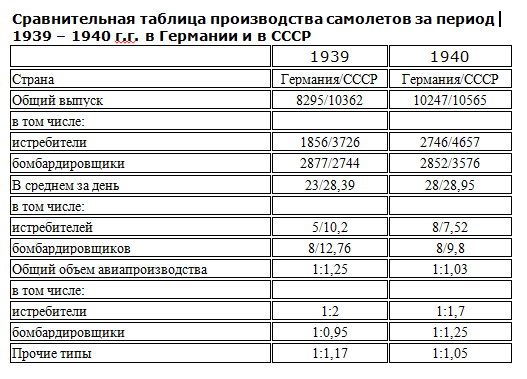
It turns out that Petrov misled the country's leadership. On the one hand, it initiated the further development and expansion of the production capacity of the Soviet aviation industry, which bore fruit in the war years. On the other hand, the result of the influence of the “German factor” was the fact that the Soviet aviation industry was spending multiple resources to eliminate, as it turned out, a non-existent quantitative lag, producing airplanes of outdated structures in large volumes, but increasing the quantitative index required by management. Therefore, to give an unambiguous assessment of the results of the secret mission of Petrov is impossible today.
Sources:
Stepanov A. Mission of General Petrov // History aviation. 2001. No.2. C. 38-46.
Petrov I. I performed the task of Stalin // Motherland. 1992. No.5. C. 32-34.
Petrov I. I consider it my duty to tell // Inventor and rationalizer. No. 4 C. 28-34.
Gribanov S. The Secret Order of Stalin // Civil Aviation. 1993. No.8. C. 36-37.
Shahurin A. Wings of victory. M .: Politizdat, 1990. C. 102- 106.
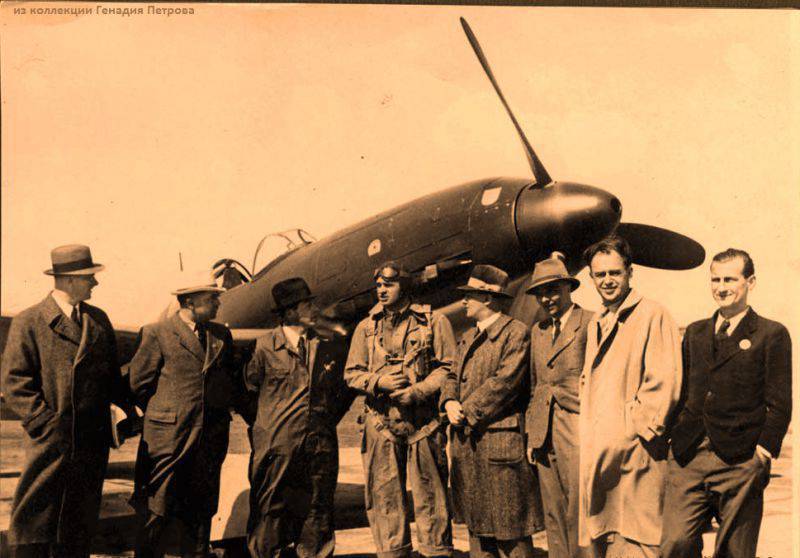
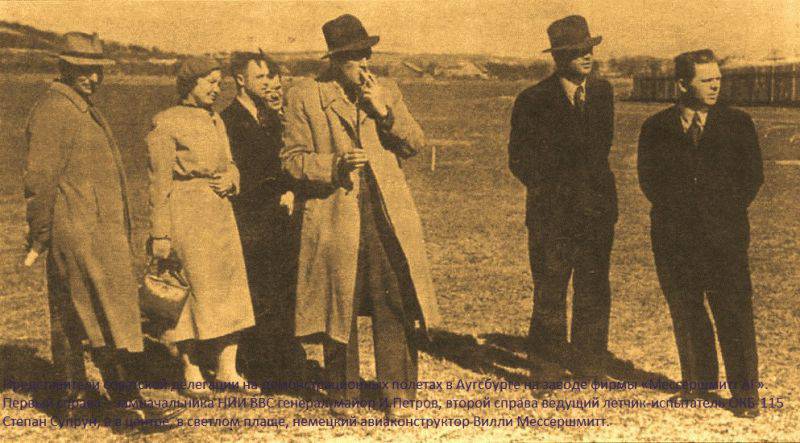
Information